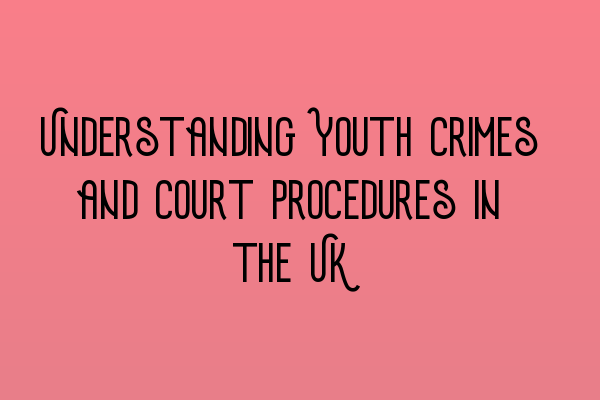Understanding Youth Crimes and Court Procedures in the UK
Youth crimes are a pressing issue in society today. As a solicitor specializing in criminal law and practice, it is crucial to have a comprehensive understanding of youth crimes and court procedures in the UK. In this blog post, we will explore key aspects of youth crimes, court processes, and provide valuable insights to help you navigate this complex area of law.
What are Youth Crimes?
Youth crimes, also known as juvenile offenses, refer to criminal activities committed by individuals under the age of 18. These crimes can range from minor offenses such as shoplifting or vandalism to more serious offenses like assault, drug-related crimes, or even murder.
It is essential to note that the UK legal system treats youth crimes differently from those committed by adults. The Youth Justice System aims to provide young offenders with support, guidance, and rehabilitation, rather than focusing solely on punishment.
The Youth Justice System
The Youth Justice System in the UK follows a specific set of procedures designed to handle youth crimes effectively. When a young person is suspected or accused of committing a crime, the process typically involves the following stages:
- Arrest: If a young person is suspected of committing a crime, they may be arrested by the police. The police must follow strict guidelines when dealing with young offenders, ensuring their welfare and rights are protected.
- Police Caution or Charge: Depending on the severity of the offense and the circumstances, the police may issue a formal caution or charge the young person. A caution is a formal warning and does not result in a criminal record, whereas a charge leads to further involvement with the Youth Justice System.
- First Hearing at the Youth Court: If charged, the young person will attend their first hearing at the Youth Court. This court specializes in dealing with cases involving young offenders. The court proceedings aim to assess the plea and decide whether the case should proceed to trial.
- Pre-sentencing Reports: Prior to sentencing, the court may request pre-sentencing reports to gather detailed information about the young person, including their background, circumstances, and any previous convictions. These reports play a significant role in determining an appropriate sentence.
- Sentencing: After considering all relevant factors, the court will decide on an appropriate sentence. The focus of sentencing in youth cases is usually on rehabilitation, education, and preventing further criminal behavior.
- Rehabilitation and Support: The Youth Justice System places great emphasis on providing young offenders with rehabilitative support. Programs such as counseling, educational courses, and community service are often implemented to help young offenders reintegrate into society successfully.
The Importance of Legal Representation
When dealing with youth crimes, legal representation is vital to ensure that the young person’s rights are protected and that they receive fair treatment throughout the legal process. As a solicitor, it is crucial to provide expert advice and support to young clients and their families.
At SQE Criminal Law & Practice Law UK, we understand the complexities and sensitivities surrounding youth crimes. Our team of experienced solicitors specializes in youth criminal cases, providing effective legal representation to safeguard the best interests of young individuals.
If you are interested in enhancing your skills and expertise in criminal law, take a look at our SQE 1 Practice Exam Questions and SQE 1 Practice Mocks FLK1 FLK2. These resources are designed to help you prepare for the SQE 1 exam, a required step in becoming a qualified solicitor in the UK.
Conclusion
Understanding youth crimes and court procedures in the UK is crucial for solicitors specializing in criminal law. The Youth Justice System provides young offenders with support and rehabilitation, aiming to guide them towards a better path. As legal professionals, it is our responsibility to ensure fair treatment and effective representation for young individuals involved in the criminal justice system.
To explore more about SQE Criminal Law & Practice Law UK and how we can help you pursue a successful career in criminal law, check out our SQE 2 Preparation Courses and SQE 1 Preparation Courses. Stay updated with the latest information on SRA SQE exam dates by visiting our page on SRA SQE Exam Dates.
